© 2026 ALLCITY Network Inc.
All rights reserved.

The Denver Broncos offseason had two main areas of the roster that needed to be addressed, quarterback and right tackle. Denver got their quarterback early on, agreeing to a deal with Case Keenum before the league’s new year even began.
Right tackle took a while longer to address, but finally, by trading away a sixth-round pick, the Broncos found their man in veteran Jared Veldheer.
Keenum might not be Tom Brady, and Veldheer isn’t Joe Thomas, but both are significant upgrades to roster spots that were amongst the worst in the league in 2017. If both can play at even just league average, all of the sudden the Broncos offense looks much improved at two of the premium positions in the game.
There’s a reason though that the Arizona Cardinals would trade away their veteran tackle after having spent big money on two different replacements for him. Which is why we had to go back to the tape to figure out who the Broncos really got in Veldheer with this trade.
Note: all the video clips below are of Veldheer (who wears No. 68) playing left tackle.
Strengths
According to our good friends at Pro Football Focus, Veldheer is coming off the worst season of his career since his rookie year. After moving back and forth from right tackle to left tackle, suffering through a losing season with multiple starting quarterbacks, and all ending with an ankle injury that cut his season short, it’s easy to see why that might’ve been.
When watching the 2017 tape—we dug into both 2016 and 2017 game film—it’s clear that Veldheer’s still a fine run blocker, with nice finishing ability. You might even call him “nasty,” which you know the Broncos like. No. 68 is a good finisher and still has it in the run game, playing with good quickness off the snap.
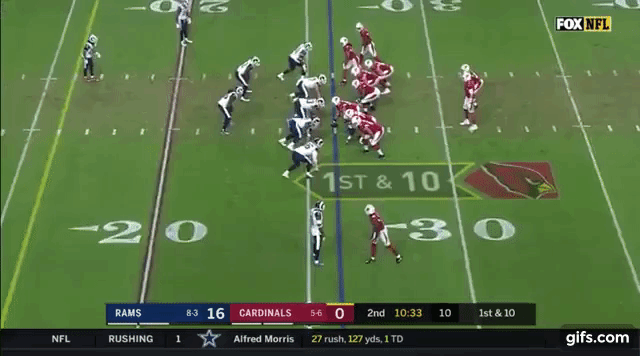
Even in a down year, he was a solid run blocker, playing with a good strong base, and good balance. He doesn’t reach or overextend and keeps defenders in front of him, keeping his feet churning while his lower and upper body stayed in sync. He shows strong hands, too, when he latches on he doesn’t let go, and does a good job keeping his hands inside—he’s only been flagged for holding five times in the last four seasons.
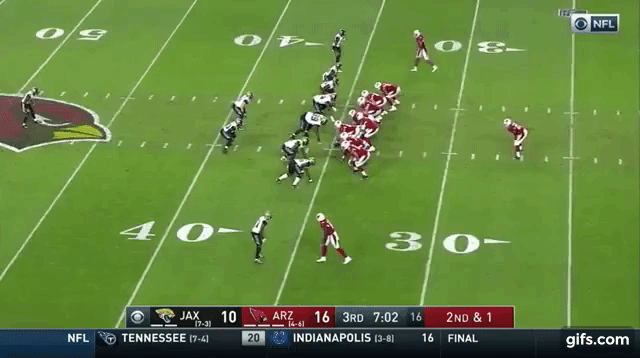
In pass protection, he still has good length, solid technique, and shows high-level awareness in pass protection. His awareness in picking up blitzes is particularly promising.
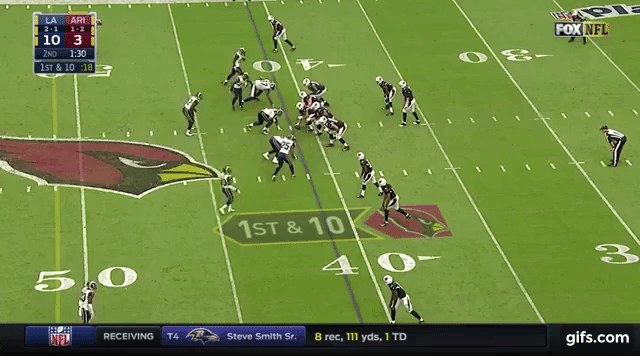
Veldheer is really good in pass pro when he has to block bigger defensive ends—280 plus pounds—playing with great functional strength. The nine-year veteran doesn’t get beat inside at all while protecting the quarterback. He especially held his own when moved back to left tackle last season and was hard to overpower.
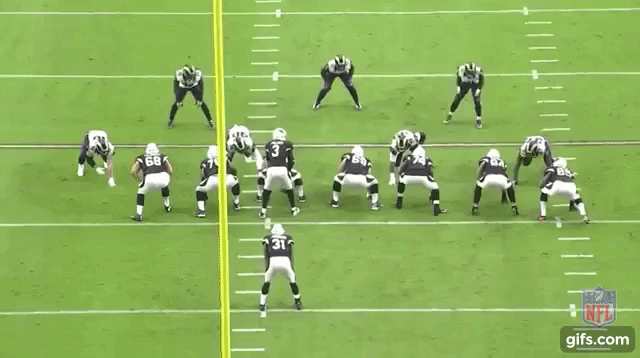
Even if beat off the edge, Veldheer uses his height well to keep rushers outside with his length, forcing them to go the long way around. A veteran QB like Keenum will benefit from his protection, and a clean pocket inside will be key.
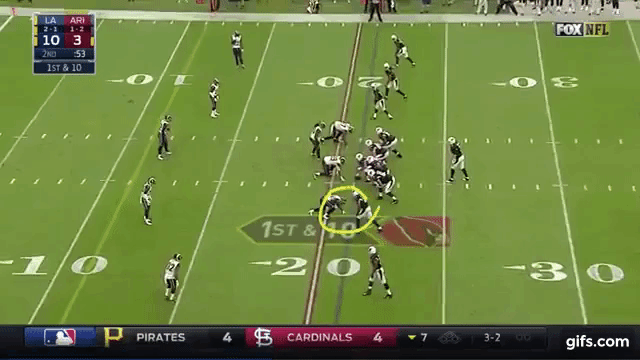
He was much better with his balance in 2016, was quicker off the snap and demonstrated a solid kick out block off the snap.
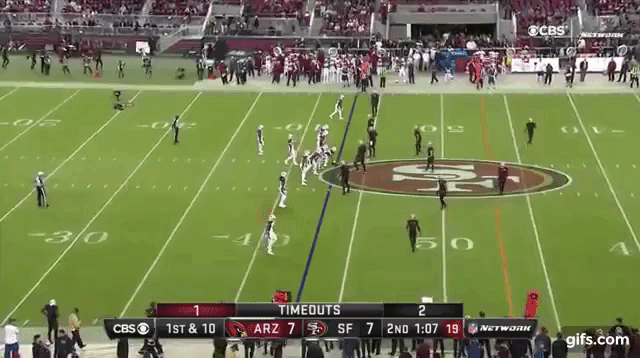
The best game I saw in 2017 was against the Jacksonville Jaguars top-end defense. Veldheer did a fine job run blocking and dominated the edge against the run. He also handled the speed of the young Jags rushers well, showing himself to be savvy and making up for a less-than-electric first step.
The biggest thing is he’s a veteran presence, who’s a plus run blocker and has experience playing either tackle spot. He’s been a top-10 player at his position for years, and could be a really good influence on Garett Bolles, showing the raw former first-round pick proper technique and how to approach the position.
Weaknesses
The big question with Veldheer is if he still has the athleticism to block outside on the edge, as injuries and a poor season led to him not being the same against speed rushers—allowing five sacks last year, most in his career since being a rookie.
His initial kick out simply looked to be a bit slow, and it’s legitimate to wonder if he was 100 percent last year, or has simply lost a half step. In going back to his 2016 tape, outside speed rushers still gave him issues. He also isn’t phenomenal getting to the second level while run blocking.
Thus, the biggest question is his ability to handle speed outside and his conditioning to handle 30-plus snaps in pass protection a game, as there were games where he struck me as a bit tired by the fourth quarter.
He can be thrown off balance as a result by elite rushers and struggled a bit with Jadeveon Clowney last season.
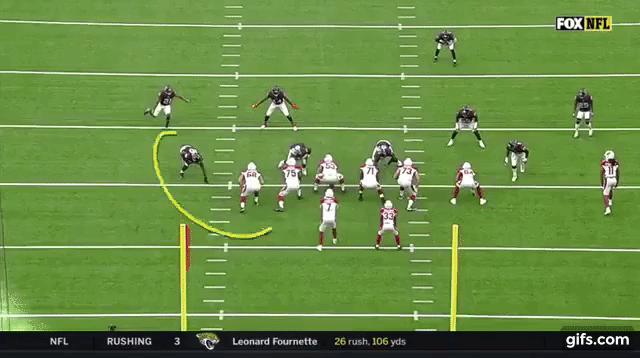
Veldheer can get put on skates at times if not balanced, and doesn’t show the best feet to recover from his initial missteps to anchor. To help him in pass protection, he’d benefit from jumbo packages and the use of a sixth offensive lineman to his side—something we saw often in Bill Musgrave’s tape study with the Oakland Raiders.
Finally, in pass protection, he can let blitzers slip in between his inside shoulder, and needs to be better protecting himself inside when an oncoming defender has a head of steam.
The veteran tackle is also guilty of not always keeping his chest clean, and needs to be better in initiating contact, using his hands to keep defenders off his chest. His initial punch can be a bit inconsistent and needs to improve.
While he’s appeared in over 100 games and is very versatile, Veldheer’s missed 11 games in the last two seasons. Injury questions are big at this point in his career. It was also clear last season that he played much better when moved from right tackle to the blind side, could this be an issue if Bolles is kept there?
In conclusion
Aside from his skills in pass protection against lighter speed-rushers, Veldheer was still pretty solid in all other areas, even in a down year. Even if he remains the 50th best OT in the NFL—which is where he ranked for PFF—he’s a serviceable starter and the best tackle option opposite Bolles on the roster, by a long mile.
Given his injuries and decline in athleticism, he feels like a short-term stopgap and not a long-term solution.
With Tramaine Brock, Clinton McDonald, and now Veldheer, the Broncos have added three guys whose best football is behind them. It’s wishful thinking to imagine all three will get back to playing the way they were two or three seasons ago, though this is the type of philosophy the New England Patriots have managed to successfully implement in the past, we’ll see if it can work in the Mile High City.
The most exciting part of this signing is the trickle-down effect. With Veldheer in place, now Menelik Watson can compete with Connor McGovern for the right guard spot and Ronald Leary can be moved back to his preferred left side. This should help the line significantly, especially if they get improved play from Bolles and Veldheer can get closer to his playing form prior to 2017.
It’s a low-risk move that can have a stabilizing effect on the offense with little downside, as at worst, Veldheer is still a starter-level tackle even if not a high-end one.
Comments
Share your thoughts
Join the conversation




